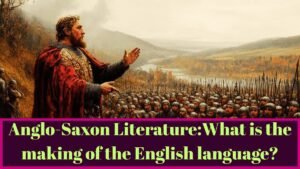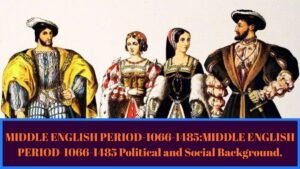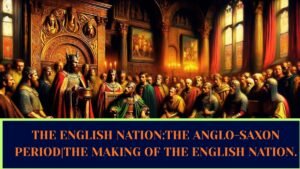Anglo-Saxon Literature:What is the making of the English language?

Anglo-Saxon Literature:The successors of Alfred not only reconquered the Danelaw but extended their rule over the whole of England and parts of Scotland. The Danes settled down under Saxon rule and the two races became almost one by intermarriage. Then in 973 there came to the throne of England Ethelred, the Unready, a weak, selfish and foolish King who undid all the good work of Alfred. A fresh tide of Danish invasion swept England, and Ethelred in-stead of fighting the invaders began buying them off with a tribute in the form of a tax called the Danegeld levied upon his subjects. This only served to attract more and more Danes claiming Danegeld. Thus menaced, the foolish King resorted to treachery. One night in peace time the English instigated by the King, fell upon the sleeping Danes and killed as many as they could could lay their hands upon. Instead of reaping the whirldwind provoked by this deed, Ethelred fled to Normandy. His son, Edmund ‘Ironside’ fought the Danes bravely, but was betrayed by a traitor and killed. There being no one to succeed him, the Saxons were compelled in sheer despair to accept Canute, King of Norway and Denmark, as their King (1016).
Canute (1016-1035) was a good and wise King and played an important part in uniting the Saxons and Danes into one nation. He employed Danes and Saxons alike and so certain was he of the loyalty of his subjects that he sent away his armies to Denmark. The Saxons and Danes lived side by side and soon forgot their old enmity. As they were essentially of the same stock and spoke different forms of the same language, the two languages vo languages in course of time became practically one. Canute’s wisdom is illustrated by the well-known story related by Hollinshed of how he rebuked his courtiers for their flattery by showing that he could not command even the tide, a small portion of water, though they said he was king and all powerful.
Canute’s sons did not live long, so in 1042 the English throne was restored to a Saxon King, Edward the Confessor (1042-1066). He was the second son of Ethelred and had been brought up in Normandy. He was more French than English and appointed his Norman friends to high offices. He was called ‘Confessor’ because of his pious and saintly character. He was, however, a weak King and was instrumental in bringing England under the rule of the Normans.
As Edward had no son, the English national assembly. the Witan, anxious for a strong ruler, chose Harold, son of the Saxon carl Godwin as their King. But Harold was not of royal blood, so William, Duke of Normandy, and the King of Norway, each laid claim to the English throne. The King of Norway in collusion with Harold’s brother Tostig landed in Northumbria. Harold defeated the Norwegian forces, but while he was in the north, William landed his forces in the south. Harold hurried south, but his armies were tired with the long march and he was deserted by the northern earls. The famous battle of Hastings was fought on October 14, 1066, and though the English fought heroically, their infantry was no match for the Norman Cavalry and they were defeated. Harold was mortally wounded and the victor William became King of England.
The Norman conquest had far reaching consequences for the future of England. In order to understand these it is necessary to know a little of the origin and early history of the Normans.
as Vikings were The Norsemen (Northmen) also known Germanic peoples of Scandinavia and Denmark. They were a pro-lific people and and were forced by the pressure of population to seek their fortunes abroad. During the ninth and tenth centuries, they terrorised the whole of Europe. We have seen how they began invading England towards the end of the eighth century and ulti-mately settled there. The Norsemen of Sweden founded a dynasty in northern Russia. The Swedes were called Rhos or rowers and the conquered land came to be known as Russia or the country of rowers. Early in the tenth century, the French King, Charles the Simple, was compelled to make peace with these fierce barbarian marauders who had been raiding France for years. He allowed them to settle in the north of France as his vassals. This territory came to be known as Normandy and its settlers as Normans. In the eleventh century, the Normans conquered England (1066) and set up Norman Kingdoms in southern Italy and Sicily. They be-came Christians, adopted French manners and customs and attained a high degree of civilisation. Despite all this, however, they re-mained for long a cruel and violent people. The Norman warriors clad in full armour fought on horseback with lances unlike the English who fought on foot and with heavy battle-axes. They had an instinct for political unity and organisation, a flair for architecture and love of luxury.
What was the first nation to speak English?

The first effect of the Norman rule in England was the politi-cal consolidation of the country. As a result, England became a feudal state like other European states in the middle ages. The feudal system was a system of land tenure based on military service. It is usually described as a pyramid with King at the apex and nobles, knights, squires and peasants or serfs in descending order forming the body and base. All land belonged to the King and was held at his pleasure by the barons in return for military service. Knights held land from the barons and squires from the Knights each owing military service to his superior. At the bottom was, the peasant or serf, bound to the soil and to his lord. Under this system the conquered Saxons were reduced to serfdom or slavery doomed to abject poverty and degradation. All high posts in Church and Government were held by Normans who treated the Saxons with contempt. French was the language of the court and of the upper classes, Latin the language of the learned, mostly the clergy who occupied the highest positions not only in the Church but also in the Government. The English language remained only a spoken language and was used only by the poor. As English ceased to be a written language, no important literature was pro-duced in England for about two hundred years, except in Latin and French. But the surprising fact is that English, though sup-pressed so long, ultimately triumphed over French. When it finally emerged as the language of the united Norman Saxon nation in the thirteenth century, it was a richer and more flexible language. It had absorbed much of the French vocabulary, and many of the words connected with government rank and honour, chivalry. military affairs, religion, architecture, cooking and dressing so familiar to us in English are French in origin and were borrowed in the years after the conquest. The Normans enriched not only the English language but also English literature by opening up new fields of romantic French literature. English scholars began trans-lating Latin religious literature into English and by and by produced original religious writings of their own, which culminated in Lang-land’s Piers Plowman (1362) and Wycliff’s Bible (1388). The romances of chivalry that had gathered round Charlemagne and the Knights were translated into English and were made popular by wandering minstrels. This popular enthusiasm for French romances of chivalry soon led to the Englishman’s producing ori-ginal literature of his own. The stage was set for the appearance of Chaucer with his Canterbury Tales. Chaucer, the first great English poet sums up the achievements of medieval England in the field of literature. But the greatest achievement was the fusion of the Anglo-Saxons and the Nor nan French into the unity of the Anglo-Norman nation Chauce is, therefore, rightly regarded as the first national poet. The national consciousness had been deve-loped by a number of historical events of the preceding three centuries. King John’s misrule provoked wide discontent and brought together under one banner all ranks of the people, barons, clergy, knights and citizens. Their joint demand compelled John to sign the Magna Carta (1215), the greatest charter of English. liberties. John also lost Norman ly and his other French territories. Until John’s time the Kings and barons had occupied themselves with French and European politics. During the years from the loss of Normandy to the Hundred Years War (1337-1453) begun by Edward III to regain his French possessions, the English Kings turned more and more to English affairs like the conquest of Wales and Scotland, and be ame English Kings in reality. Wales was conquered and Scotland though unconquered, was anglicised. The institution of Parliament in the reign of Edward I also helped to foster the sense of a united nation by bringing to- gether all classes of people for a common national purpose. The Hundred Years War which resulted in the loss to England of all her French possessio possessions except Calais, had yet one compensating advantage. The English and the Normans were both equally proud of the glorious victories over the French won at Crecy, Poitiers and Agincourt. It was soon apparent that it was a racial war and the Normans and the English alike hated the common enemy, the French, and regarded French as an enemy language. This feeling put an end to the snobbery of the Normans who now began to think of themselves not as a separate race but as one people with the English.
The character of a people is determined by many factors, the chief of which are history and geography. While some characteris-tics of Englishmen may be traced to their ancestry and the events of history, others can be explained only by the geography of England. Living in an island, the English are a sea-faring people, bold, roving and adventurous. The tang of the sea is never absent from their literature. They are spread all over the world and their empire while it lasted was the greatest the world has known. Their island position has made them insular and exclusive and while their climate-misty, rainy and cold-has made them hardy and tenacious, it has also made them a little too glum and unfriend-ly to be universally likeable. But under his forbidding exterior, the Englishman hides a heart of gold. His sense of honour, of justice and fair play, and his loyalty have won him respect every-where. The practical necessities of life in an island have made him eminently practical in outlook. He hates abstractions and generalisations and shows his practical commonsense in conserva-tism as well as in compromise. His habit of understatement is the most eloquent testimony not only to his sense of humour but to his inborn stoicism that hates display of emotion. The English landscape with its undulating plains, hills and valleys, rivers and lakes, green lanes and meadows explains the Englishman’s love of the countryside and the beauties of Nature.
But above all, the Englishman loves freedom. This is a recurrent theme in English literature. He is instinctively law-abiding, but quite as instinctively hates laws. “An Englishman’s house is his Castle”, because he hates restrictions and is impatient of any-thing that savours of interference with his personal liberty.
In the above assessment we notice certain contradictions in the character of the Englishman. He is friendly at heart, but appears unfriendly. He has a genial sense of humour, but appears quite humourless. He feels deeply, but appears cold and unfeeling. He is law-abiding, but hates laws. It is perhaps on account of these contradictory traits that foreigners say the English are ‘mad’. This is, however, a joke. Take him all in all, and the Englishman embodies the rough good nature of his Anglo-Saxon ancestors. tempered by the elegance, gaiety and chivalry of the French.




